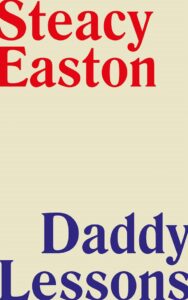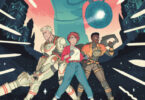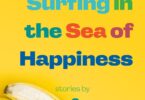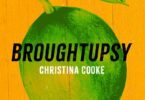Steacy Easton, Daddy Lessons (Coach House Books, 2023), 160pp., $21.95.
Content warning for childhood sexual abuse
Steacy Easton’s memoir in “lessons” opens with a prologue that pulls no punches. Referring to the book, they state bluntly: “This is pornography in the sense that it is explicit. It talks about mouths, assholes, cocks, cunts, hands—but it is the ritual of those body parts and how we write and consider those body parts.” There is a warning here—read at your own risk, particularly if you are squeamish about frank talk of fucking. But there is also a promise; queer pleasure and the fulfillment of complex desires will be described in detail within. You might be left aroused. You might be left uncomfortable. But you will not be left unsatisfied.
With Daddy Lessons, Easton gives us an intimate collection of essays where they access formative sexual experiences, often with older men, through the lens of memory. In the absence of their own father (in the very first essay, Easton says, “… in a lifetime of disappointments, he couldn’t even do the bare minimum, he couldn’t even show up.”), and in response to their hunger for intimacy and authority, they seek out a multitude of “daddy” stand-ins. From falling in love at age eight with an eighteen-year-old fellow Mormon, to being eighteen themself and getting caught giving head to a Mormon missionary who claimed he was “seduced,” Easton recounts these early experiences with a tenderness for the kid they were. Weaving their own experiences with Mormon texts and teachings, Easton builds a framework for how the Mormon obsession with discipline, purity, and what it means to “be a man” shapes both who they came to desire and how they learned desire should be fulfilled.
If desire is a central theme throughout the book, it exists alongside discomfort. There are essays in Daddy Lessons that are hard to read. Easton writes with candor and the clarity that comes with adulthood (and much therapy, as they affirm), about being sent away to reform school at age twelve. They were raped at that school. They were physically and sexually abused by adult men in positions of authority. There is a murkiness to this terrain that Easton acknowledges; a shared secrecy in a child’s desire for adult access to power and pleasure, and in an adult’s desire for power and pleasure where consent is not possible. The key lesson that emerges and which Easton ultimately makes very clear is this: “… at twelve years old, no matter what I wanted, I was coerced; that what I wanted and what was right for him to give were radically different.”
Although largely anchored by memory alone, Easton also draws on a variety of contemporary writing about sex to contextualize their experiences, including discussions of Neil LaBute, James Salter, Eve Kosofsky Sedgwick, Garth Greenwell, and Lorelei James. In one of the book’s standout essays titled “Lesson Eleven: Cowboy Takes Me Away,” Easton pairs skillful deconstruction of James’ “cowboy smut” with their own experience of “screwing a rodeo cowboy through central Alberta.” Through contrasting the hyper-masculine image of the cowboy that James presents with their real-life Canadian cowboy, Easton effectively invites the reader to question masculine archetypes and look a little closer at the ways in which queerness can be layered on (or obscured/erased) for characters like the cowboy, whether real or imagined.
One of the more delicious elements of this book is Easton’s willingness to write about their lovers with a sensuousness to make Lorelei James proud. About the cowboy, for example, Easton says: “The rodeo cowboy in question was short but broad-shouldered and broad-chested. His hair was thick and tousled… My favourite time to kiss him was Friday because I love beard against stubble; friction like kindling.” There is little reproach, and in some cases, lingering longing, for those they have fucked, or still fantasize about fucking, even when the lessons imparted have been cruel. Easton doesn’t shy away from the messiness of sex, its complicated power dynamics, and its vivid sensory pleasures—in this way, they deliver on the prologue’s promise of pornography. But where both porn and memoir often fall into performative traps, Easton’s writing is driven by honesty and curiosity, lending the book’s most explicit moments a rare authentic kind of heat.
The reality and fluidity of the body is at the heart of Daddy Lessons. The way bodies tangle and sweat and need and connect. The ways desire and power shapeshift and mingle. Of their own body, their own unruly desire, Easton writes, “I wasn’t a boy, I wasn’t a girl, I wasn’t a top, I wasn’t a bottom, all I wanted was mouths all over me, and my mouth all over them.” These explorations of wanting are confessional, cerebral and carnal in equal measure; the academic and erotic smashed together on the page. It takes courage to write a book like this, and also, to read a book like this. Easton functions as storyteller and protagonist, pornographer, and scholar, and for those readers ready to engage, they will discover lessons learned, unlearned, re-learned and maybe, an appetite to learn more.
 Anuja Varghese (she/her) is an award-winning writer and editor based in Hamilton, ON. Her work appears in Hobart, The Malahat Review, The Fiddlehead, and Plenitude Magazine, as well as the Best Women’s Erotica Volume 6 and Queer Little Nightmares anthologies, among others. Her debut short story collection, titled Chrysalis (House of Anansi Press, 2023) explores South Asian diaspora experience through a feminist, speculative lens. In 2023, Chrysalis won the Writers Trust Dayne Ogilvie Prize and the Governor General’s Literary Award for Fiction. Find Anuja on Twitter, Instagram and TikTok (@anuja_v across platforms) or through her website www.anujavarghese.com.
Anuja Varghese (she/her) is an award-winning writer and editor based in Hamilton, ON. Her work appears in Hobart, The Malahat Review, The Fiddlehead, and Plenitude Magazine, as well as the Best Women’s Erotica Volume 6 and Queer Little Nightmares anthologies, among others. Her debut short story collection, titled Chrysalis (House of Anansi Press, 2023) explores South Asian diaspora experience through a feminist, speculative lens. In 2023, Chrysalis won the Writers Trust Dayne Ogilvie Prize and the Governor General’s Literary Award for Fiction. Find Anuja on Twitter, Instagram and TikTok (@anuja_v across platforms) or through her website www.anujavarghese.com.







